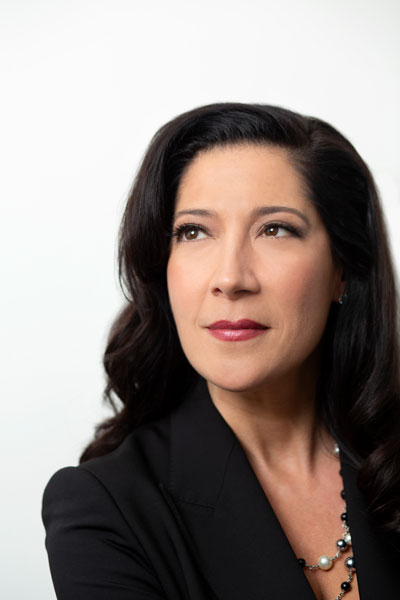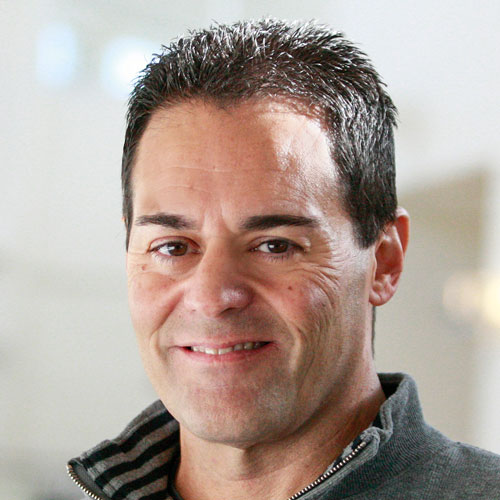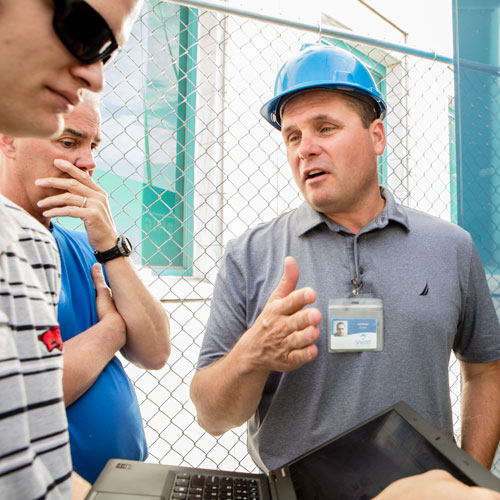Chicago Cut Concrete Cutting (Chicago Cut CC) has left its mark on a remarkable number of Chicago-area landmarks. Its electric sawing and core drilling helped Google headquarters and the Michigan Avenue flagship Starbucks come alive. The company has done renovations on Argonne National Laboratory, the United Center, Wrigley Field, the Chicago Board of Trade, and the John Hancock Building. Chicago Cut CC’s work can also be glimpsed at Maggie Daley Park, the Chicago Bears’ Halas Hall, and the Old Post Office.
But the prestige of the projects they’ve worked on isn’t the only distinctive thing about Chicago Cut CC. Its president, Tiffany Phillips, is a multitalented entrepreneur with a unique business background, and she’s committed to bringing innovation to the concrete industry to ensure a safe, healthy, and proudly diverse workplace.
Phillips began her career in advertising, educating consumers about products from major international brands. But, after 15 years in the business, she says, “I needed a change and a challenge.” She decided to “go back to my roots and union family,” which meant entering the construction business.
Because of her years in advertising, Phillips is open to change and experimentation in ways that might be uncommon in the concrete-cutting industry. She also made sure she was as knowledgeable as anyone in the field, racking up certifications in concrete-construction management, concrete sawing and drilling, project management, and leadership skills. “I wasn’t going to settle for doing it the old way if it could be done better and more efficiently,” she says.
Chicago Cut CC began as a “little two-truck company,” but it grew rapidly thanks to Phillips’s work and the work of her dream team, which includes some of the best in the industry, she says. When hiring, Phillips adds, she keeps in mind a quote from Olive Ann Beech: “I like to have around me people who find ways to do things, not tell me why they can’t be done.”

Photo by Gillian Fry
According to Phillips, her company flourished because of its commitment to customer service and collaboration. The secret to making customers happy, she says, is simple: it involves finding solutions. “Our job is to make our customer look good,” she explains. “We do that by providing cost-effective and safe solutions that get the job done right.” Phillips says that Chicago Cut CC’s approach allows the company to deliver the safest, most effective results, which satisfy its partners’ requirements while also adhering to the highest standards for safety and quality.
Chicago Cut CC stands out as a woman-owned business in an industry where less than 10 percent are owned by women, according to the US Census Bureau. Phillips has received a number of diversity certifications, including the Woman Business Enterprise (WBE) certificate from the City of Chicago and in the state of Illinois (CMS/BEP), as well as a National Women Business Owners Corporation (NWBOC) certification and a Woman Owned Small Business (WOSB) federal contracting certificate.
Choosing to work with women-owned firms adds value in a number of ways. “It benefits the industry as a whole,” says Phillips. In addition to meeting diversity requirements, working with women-opened businesses provides multiple procurement channels for companies, allowing them to choose the best fit for the company’s needs and supporting a more merit-based system. It can also provide tax incentives in some states, and according to research from the Hackett Group, procurement organizations who work with a diverse supplier base have lower overall operating costs and spend 20 percent less on their total buying operations.
Phillips also finds it personally meaningful to help create space for women in the construction industry. “It is important,” she says, “that I continue to create change and inspire the next generation.”
Chicago Cut CC is leading the industry in more than just diversity; it is also on the cutting edge of safety regulations for its workers. Years before the Occupational Safety and Health Administration officially adopted similar rules, Phillips says, Chicago Cut CC worked to limit “workers’ access to areas where silica exposures are high, used effective methods for reducing exposures, provided medical exams to workers with high silica exposures, and trained workers about silica-related hazards and how to limit exposure.”
Silica is a mineral found in many construction materials, including stone, concrete, and mortar. When concrete is cut, drilled, sawed, or worked on in other ways, it creates respirable crystalline silica—tiny particles that can cause lung cancer, kidney disease, chronic obstructive pulmonary disease, and the incurable lung disease silicosis.
In other words, silica is commonplace on construction sites and a potential harbinger of life-ending or disabling ailments. That’s why high safety standards are so important—and why Chicago Cut CC’s early adherence to these standards is so laudable. “All in all, Chicago Cut Concrete Cutting is always moving forward and progressing with all safety procedures to keep employees safe and efficient by maintaining the best quality control possible,” Phillips says. “Our end goal here is for each worker to come home each and every day the same way they left, if not better.”
Phillips and her company have left their mark on the Chicagoland area. It can be glimpsed at Maggie Daley Park, the Chicago Bears’ Halas Hall, and the Old Post Office, among other places. And, they’re also making their mark on the concrete industry. With a strong commitment to innovation, diversity, and safety, they’re pioneering a better way forward for the industry.


